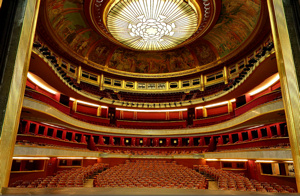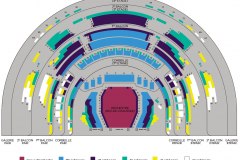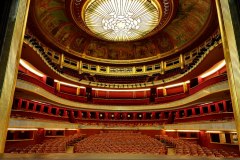Theodora
October 2025 | ||||||
|---|---|---|---|---|---|---|
Mo | Tu | We | Th | Fr | Sa | Su |
Theodora – Georg Friedrich Handel | Opera in Concert
Duration: Approximately 3 hours
Sung in English, with surtitles in French / English
The sublime and poignant Theodora by Handel.
The penultimate work of Handel and the only one of his mature oratorios based on a Christian subject, Theodora is, beyond a testamentary page of incredible intensity, a sublime plea for tolerance. In 1749, the composer was sixty-four years old. His successes in opera seria were already distant, and for the past ten years, he had turned to the oratorio form. With a dramatic force worthy of the greatest tragedies, the work exalts the martyrdom of a chaste Christian woman persecuted by the Romans at the beginning of our era. All colors and nuances are called upon in this grandiose score to exalt virtue and faith.
Production: Théâtre des Champs-Élysées
Synopsis
Act 1
The 4th century AD. Valens, the Roman governor of Antioch, issues a decree that in honour of Diocletian's birthday all citizens will offer sacrifice to Venus, the Roman goddess of love, and Flora, a fertility goddess of the spring, on pain of death, and puts Septimius in charge of enforcing this.
Didymus, a soldier secretly converted to Christianity, asks that citizens whose consciences prevent them making sacrifices to idols be spared punishment, which Valens dismisses. Septimius suspects Didymus is a Christian and affirms his own loyalty to the law although he pities those who will be condemned to die by the decree and wishes he could be allowed to extend mercy to them.
Theodora, a nobly born Christian and her friend Irene are worshipping with their fellow believers in private rather than joining in the festival for the emperor's birthday when a messenger brings news of Valens' decree. Septimius comes to arrest them – Theodora expects to be put to death but is informed that instead she has been sentenced to serve as a prostitute in the temple of Venus. Theodora would much have preferred to die, but is led away to the temple. Irene informs Didymus who goes in the hope of either rescuing her or dying with her. The first act closes with a chorus of Christians praying for the mission's success.
Act 2
At the start of the second act the festival in honour of the emperor and the goddesses is being enjoyed by the pagans. Valens sends Septimius to tell Theodora that if she doesn't join in with the festival by the end of the day, he will send his guards to rape her. The crowd expresses their satisfaction at this sentence. In the temple of Venus which serves as a brothel, Theodora is frightened, but her mood changes as she contemplates the afterlife. Didymus confesses to his friend and superior officer Septimius that he is a Christian and appeals to the other man's sense of decency. Septimius allows Didymus to visit Theodora. At first Theodora appeals to Didymus to kill her and put an end to her suffering, but instead Didymus persuades her to conceal her identity by putting on his helmet and his uniform and escaping, leaving Didymus in her place. Back at their hideout, Irene and the Christians recall the miracle of The Widow of Nain and hope that, should the lovers die, they will find a new life in heaven.
Act 3
As the third part opens the Christians celebrate Theodora's safe return. However she feels guilty that she endangered Didymus's life in order to save her own. A messenger informs them Didymus has been captured and that Valens has changed Theodora's punishment to death. Theodora goes to offer herself in Didymus' place, despite the protests of her faithful friend Irene. As Valens sentences Didymus to be executed, Theodora enters demanding that she die and Didymus be saved. Both Didymus and Theodora argue that they should die in place of the other. Septimius is moved by this, and pleads for clemency. Valens, however, condemns both Didymus and Theodora to death and they sing a duet to their immortality.
Program and cast
Lea Desandre | Theodora
Hugh Cutting | Didymus
Véronique Gens | Irene
Laurence Kilsby | Septimius
Alex Rosen | Valens
Ensemble Jupiter
Thomas Dunford | Direction
Théâtre des Champs-Élysées

The Théâtre des Champs- Elysées is undoubtedly one of the finest venues in Paris . Built in 1913 , it has the distinction of having been designed by a group of artists architects Henry Van de Velde and Auguste Perret , the painter and sculptor Antoine Bourdelle , the painter Maurice Denis , and the crystal- René Lalique to do mention the main ones . He was the first Parisian theater to be built entirely of reinforced concrete.
Restoration of the Great Hall devoted to operatic performances , symphony concerts and dance was decided in 1985. Two years later , on 23 September 1987, the theater reopened its doors , completely renovated. Fifteen years after this important work it was decided to undertake a new renovation campaign , but to prevent the complete closure of the theater for an entire season , work is now carried by step during the summer . Then it is to replace aging equipment , to remedy wear certain parts of the theater and improve spectator comfort and artists during their visit . Thus in recent years, including the work involved the renovation of marble facade, replacing the carpet in the room with wooden floors , installation of a new fully decorated wooden concert to a significant improvement of acoustics, the orchestra pit and stage below .
The Théâtre des Champs- Elysées is now a modern working tool receiving each year nearly 300,000 spectators and a few thousands of artists and collaborators.
The Théâtre des Champs- Elysées , the jewel of French architecture of the twentieth century, was in 1953 one of the first buildings of contemporary architectural heritage to be classified as historic monuments . Since 1970 the Caisse des Dépôts owns the entire building 15 avenue Montaigne and principal patron of the theater.
For over a century, Théâtre des Champs-Elysées has been the place where the most celebrated artists have come to make their names in Paris. The world’s finest orchestras and world-class soloists have always been a fixture at the Theatre. Théâtre des Champs-Elysées presents more than 200 concerts each year and is renowned for its outstanding performances of all genres, from classical music concerts and staged opera to contemporary dance and jazz.
How to reach us:
Subway: Alma-Marceau (line 9), Franklin D.Roosevelt (line 1), Pont de l’Alma (RER line C)
Bus: n° 42, 63, 72, 80, 92
Taxi station: Place de l’Alma, corner of avenue George V
Car park: Alma George V. The entrance is in front of n° 19, avenue George V
Fixed rate depending on the length of the performance. Payment upon entering.

 EN
EN DE
DE IT
IT FR
FR ES
ES RU
RU JP
JP RO
RO
 Seating plan
Seating plan 